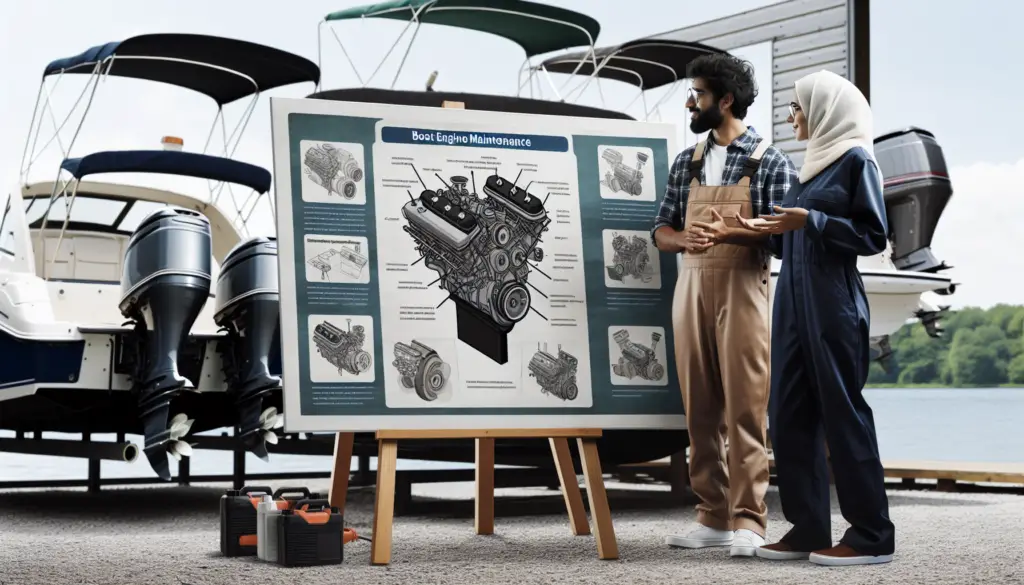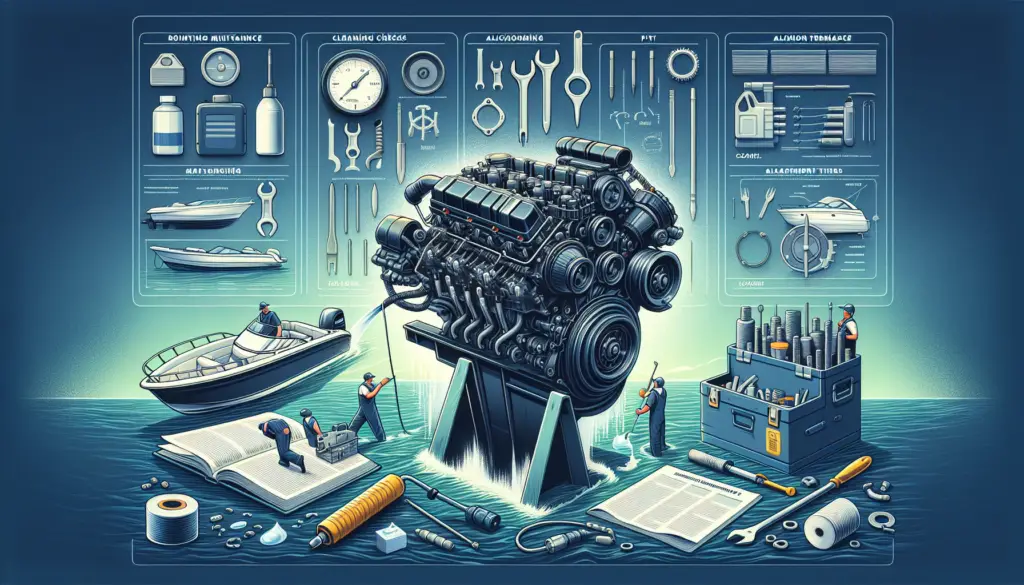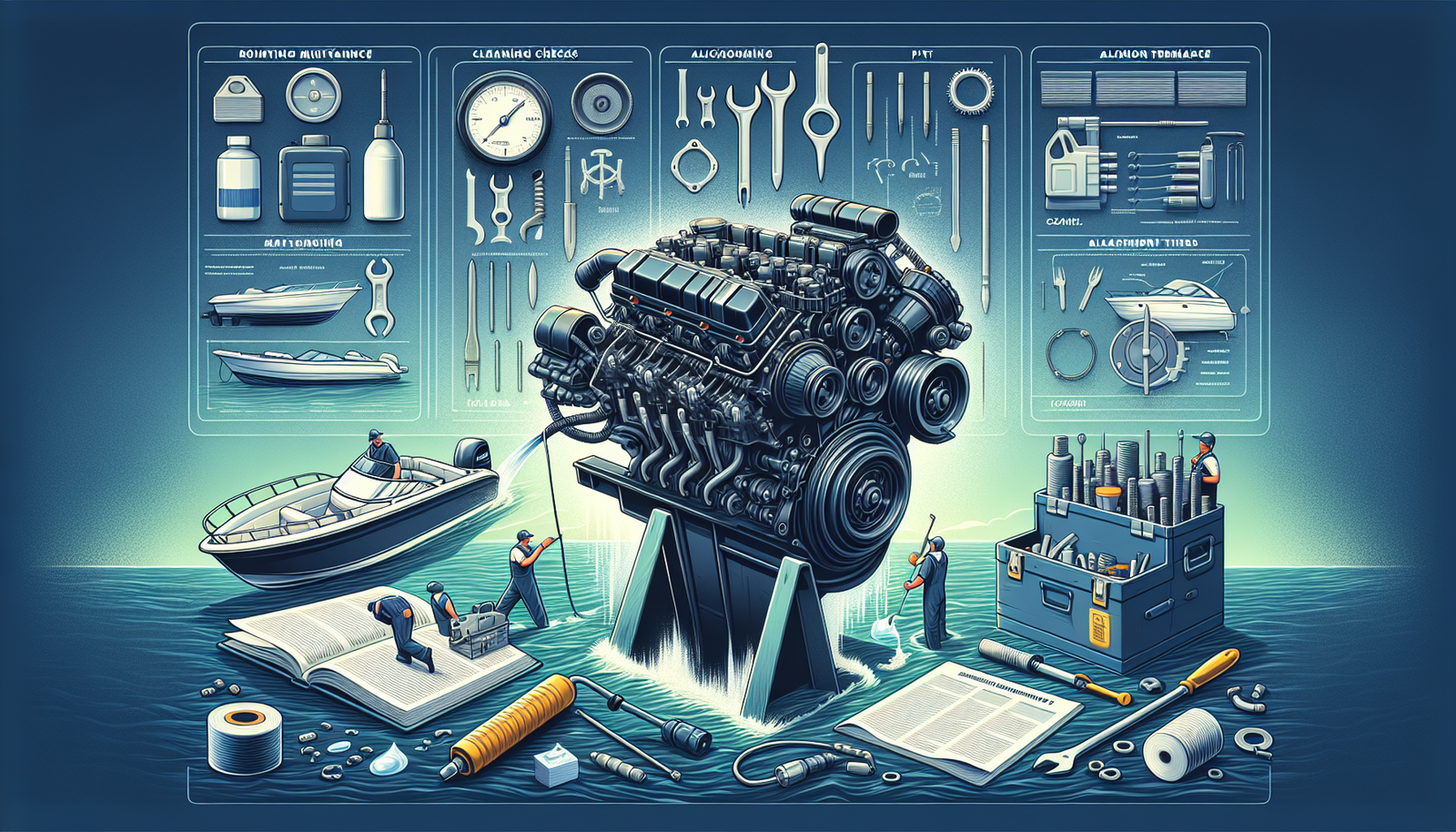At some point, every boat owner will face the inevitable challenge of engine maintenance. “How To Properly Maintain And Service Your Boat Engine For Reliable Performance” is your go-to guide that helps you nudge ahead with confidence. Whether it’s about careful checks, methodical repairs, or strategic replacements, this guide has you covered extensively. Not only will it aid in enhancing the longevity of your boat’s engine, but it also ensures optimum performance each time you set out in the waters. So, brace yourself as this knowledgeable guide allows you to master the art of boat engine maintenance without any professional help.

Understanding Your Boat Engine
Understanding the ins and outs of your boat engine is essential for proper maintenance and efficient performance. Let’s start by identifying basic parts and their functions, understanding the types of boat engines, and digesting our boat’s manual.
Identifying basic parts and their functions
The boat engine comprises several vital parts, each with a unique function that contributes to the overall performance of your boat. The main component is the engine block, housing the cylinders where combustion happens. The crankshaft converts the piston’s movement into rotational motion, driving the boat forward. Then we have the carburetor, which mixes air and fuel for combustion, and the spark plugs which ignite this mixture. Other crucial parts include belts, oil filters, fuel filters, and the cooling system.
Types of boat engines
Boat engines come in various types. Most common are the outboard engines, which are self-contained units mounted at the back of the boat. You also have inboard engines, typically located in the center of the boat, and sterndrive or inboard/outboard engines, that combine elements of the inboard and outboard types for increased performance.
Reading and understanding your boat’s manual
The boat’s manual is your go-to guide for everything about your boat’s engine. It provides detailed insights about the engine, parts, their functioning, maintenance schedules, and troubleshooting tips. Understanding it thoroughly equips you with the necessary knowledge to maintain the engine and ensure its optimal functionality.
Basic Maintenance Tips
Next, let’s discuss some basic maintenance tips that will keep your boat engine in peak condition for your adventures.
Regular cleaning of the engine
Regular cleaning of the engine extends its life and aids its performance. Use a specialized engine cleaner to get rid of any oil, grime, or dirt. Ensure to protect electrical connections before cleaning and dry off everything after thoroughly.
Inspecting and replacing damaged parts
During routine cleaning, take some time to inspect your engine for any visible signs of damage. Wear and tear are inevitable so check for any cracks, corrosion, or leaks. Replace damaged parts promptly to avoid costly repairs and possible engine failure.
Proper engine storage when not in use
Proper storage is crucial when your boat is not in use. Get it winterized if stored during colder months to prevent engine damage from freezing temperatures. Moreover, it’s crucial to keep the engine covered and well-oiled to prevent rusting and corrosion.
Boat Engine Lubrication
Just like the joints in your body, your boat engine needs regular lubrication to maintain smooth movement and leveling wear.
Choosing the right engine oil
Selecting the right oil for your engine is essential. The type of oil you need depends on your engine model and type. Your boat’s manual should provide this information. Generally, marine-grade oil is recommended for boat engines due to their ability to perform well in marine conditions.
Proper engine lubrication methods
Proper lubrication involves cleaning the oil filter and drain plug, draining old oil, adding new oil, and checking for leaks. Don’t just focus on the engine, though. Other moving parts such as hinges, linkages, and cables need lubricating too.
Frequency of engine lubrication
Generally, it’s advised to change engine oil every 50-100 hours of operation or at least once a year if you don’t use your boat that often. However, always check your boat’s manual for specific guidance on your boat engine model.

Filter Inspections and Replacements
Filters protect your engine from harmful particles; therefore, it’s important to regularly inspect and replace them.
Recognizing signs of a clogged or dirty filter
Signs your filter may be clogged include poor fuel economy, difficulty starting the engine, or reduced horsepower. Regular inspection and cleaning can help prevent this.
Procedures for replacing engine filters
Replacing a filter is a relatively simple process. Once you get a new filter, remove the old one, apply some fresh oil to the replacement filter’s seal, and then screw it into place. Be careful not to overtighten it.
Selecting the right replacement filter
Always check your boat’s manual or consult with your mechanic to ensure you’re purchasing the right filter for your engine. Using the wrong one can cause engine problems.
Cooling System Maintenance
The cooling system is key to your engine’s health. It prevents the engine from overheating, which can cause severe damage.
Understanding the importance of engine cooling
Engines generate a lot of heat while running. If not managed, this heat can cause serious damage, including warped cylinders, melted pistons, or even total engine failure.
Checking the cooling system for leaks and blockages
Regularly check the coolant level, looking for any obvious signs of leakage. Inspect the coolant system for blockages, paying particular attention to the impeller, raw-water strainer, sea-cock, and hoses.
Flushing and replacing engine coolant
Over time, engine coolant can degrade or become contaminated. Flush and replace it as per the guidance in your boat’s manual, usually annually.
Fuel System Maintenance
Proper fuel system maintenance ensures optimal engine performance and can extend its life.
Using the correct fuel for your engine
Always use the correct type of fuel as specified in the manual. Using the wrong fuel can cause serious damage to your engine.
Cleaning and maintaining the fuel injection system
Over time, deposits can build up in the fuel injection system and affect engine performance. Use a fuel system cleaner occasionally to keep it running smoothly.
Replacing the fuel filter
Lastly, replace the fuel filter as recommended in your boat’s manual. A dirty fuel filter limits the fuel flow to the engine, which can cause poor engine performance.
Battery Maintenance and Replacement
Your boat engine depends on a reliable battery to operate efficiently.
Checking and maintaining battery power
Regularly check the battery’s voltage level to ensure it’s charged correctly and capable of providing enough power to start the engine when needed.
Identifying signs of a low or dead battery
Signs of a weak battery may include slow starting of the engine, dim lights, or the need for frequent jump-starts. Ensure to replace such a battery as soon as possible to prevent getting stranded.
Choosing the right battery for your boat engine
Always choose the right battery for your boat’s engine. The ideal battery should have enough capacity to start the engine and power other onboard electronics.
Engine Belt Maintenance
Engine belts are crucial in the proper functioning of your boat engine. They drive the alternator, water pump, and other key systems.
Inspecting belts for wear and tear
Regularly inspect belts for signs of wear, such as cracks and fraying. A damaged belt can break and cause engine overheating or battery drain.
Tightening or replacing loose or worn belts
Ensure that your engine belts are always tight but not overly so. A loose or worn-out belt should be replaced immediately.
Understanding the role of belts in engine performance
Engine belts play a crucial role in synchronizing various engine parts and systems. They transfer power from the engine to the alternator, water pump, and other devices.
Routine Engine Checks
Regular engine checks can help you spot potential issues before they turn into major problems.
Checking engine for unusual noises or vibrations
Pay close attention to any unusual noises or vibrations while the engine is running. Such could indicate a loose part or another underlying issue.
Inspecting engine for leaks or corrosion
Regularly inspect the engine for leaks or signs of corrosion. Leaks could lead to low coolant or oil levels, leading to engine overheating. Corrosion often indicates the presence of salt or moisture, which can cause engine damage.
Scheduling regular professional inspections
Despite doing regular checks yourself, scheduling professional inspections at least once a year can help identify and fix any budding issues that you may have missed.
Emergency Preparedness
Being prepared for emergencies can help reduce panic and damage when something goes wrong with your boat’s engine.
Carrying basic repair tools on board
Always carry basic repair tools like wrenches, screwdrivers, pliers, and a flashlight on board. They can come in handy when you have to perform a quick fix while out in the water.
Knowing basic engine troubleshooting
Familiarize yourself with basic engine troubleshooting procedures, like how to replace a fuel filter or what to do in case of engine overheating. Your boat’s manual should provide useful information in this regard.
Understanding emergency procedures in case of engine failure
Knowing what to do in case of engine failure could make a big difference. This could include steps such as signaling for help, getting the boat to a safe location if possible, and disconnecting the battery to avoid a possible fire. Again, your boat’s manual is a great resource for this information.
Remember, maintaining your boat engine isn’t just a one-time thing; it’s an ongoing responsibility that helps you avoid expensive repairs and gives you the peace of mind to truly enjoy your boating experience.


[…] ownership comes with its fair share of responsibilities. One of the most critical is regular maintenance, particularly of the engine cooling system. Regularly maintaining your boat’s cooling system […]